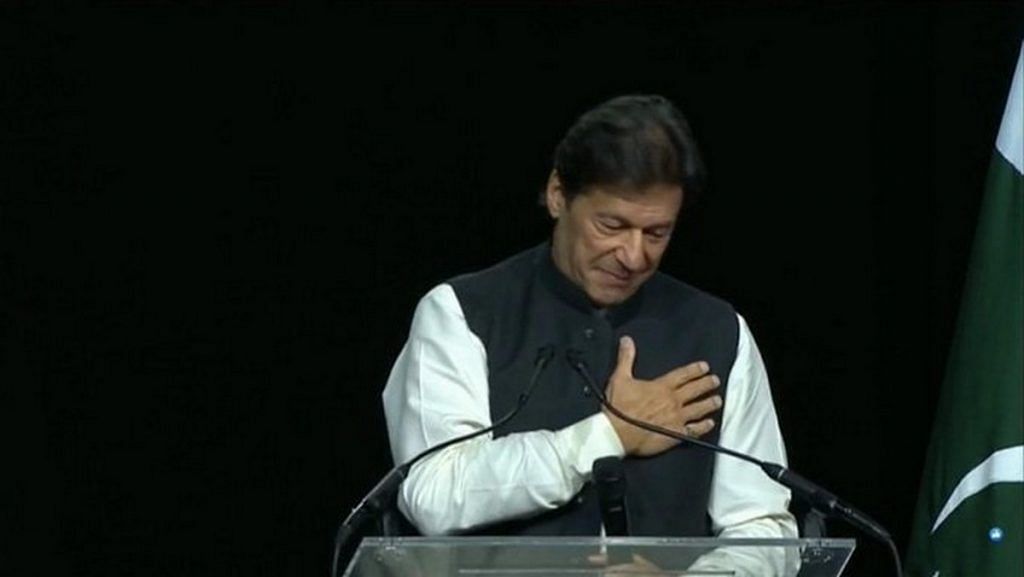Things have taken a rather dark turn between the forever-estranged eastern neighbours. India has asked 50 per cent of the staff at Pakistan High Commission in Delhi to ‘Go to Pakistan’. This comes after weeks of diplomatic tussle and reprimands from both sides. First, two Pakistani diplomats were accused of spying and sent back, then came the hit-and-run charge against two Indian officials at the High Commission in Islamabad who were later released.
The maltreatment of the two men has become a pretext to downgrade diplomatic ties. The last time this happened was in 2001 after an attack on the Indian Parliament. Then in August 2019, Pakistan downgraded the ties after India’s abolition of Article 370 and called back both its high commissioners from New Delhi.
Also read: Balakot, blackout and IAF: When Pakistanis couldn’t stop the rumours Imran Khan had fueled
Happy at LAC fallout
Pakistanis see the current move as an eyewash by the Narendra Modi government, which is embroiled in a military stand-off with China at the Line of Actual Control (LAC) — a dispute that many Pakistanis are elated over. But they forget that the territory China claims to occupy, in Ladakh, is something that many Pakistanis believe will one day become part of their country. So what if it could never be part of Pakistan, let us root for China so that at least it’s not India’s anymore.
But for now, the enemy of my enemy is my best friend, national interest is Chinese interest. And Pakistanis are happy with that.
Perhaps to solidify that stance, Foreign Minister Shah Mahmood Qureshi recently said that China was in the right when it reacted because India began construction work in the disputed territory.
Also read: Pigeons aren’t first. India-Pakistan have long been sending deer, monkey spies
The dilemma at UN
It all feeds into the tension that started brewing between India and Pakistan in February 2019, after the Pulwama attack and the subsequent airstrikes in Balakot. And expecting that tension to simmer down anytime soon is like imagining our lives without the coronavirus.
For now, though, Pakistanis are happy that India has been isolated diplomatically — don’t ask how. India on 18 June became a non-permanent member of the UN Security Council with 184 votes, a candidacy that was backed by Pakistan last year. The foreign minister was seen justifying it, saying no hell will break loose even if India became a UNSC member. Now, this was akin to selling out the ‘Kashmir cause’, which has forever kept the kettle of Pakistani political establishment boiling.
And so it wasn’t going to be that easy for the Imran Khan government. Qureshi’s own colleague in the cabinet, Human Rights Minister Shireen Mazari, was of the view that India shouldn’t have been given an open field like this. But Qureshi maintained that if Pakistan stopped India from becoming the non-permanent member of UNSC, Pakistan’s own chances of becoming a member in 2026 would be weakened. Since nothing could be done now, all Pakistan could do was look the other way as India’s membership was confirmed. Now, if ever India were to become a permanent member of the UNSC, we can console ourselves that no hell will break loose.
Also read: Pakistanis are not just scared of coronavirus but of ‘colonel ki biwi’ too
PMO’s Twitter shield
Pakistan’s recent run at gathering numbers for any cause at the UN has been laughable to say the least. We remember how Prime Minister Imran Khan boasted that 58 countries backed Pakistan over the issue of Kashmir at the United Nations Human Rights Council. It’s a different matter that there are only 47 countries in the council, and even the details about their stance — what they said in support, what does the support entail — remain a mystery one year on.
The promises of a UNSC resolution on India’s actions in Kashmir couldn’t see the light of day, as PM Khan and his team couldn’t garner even 15 votes. This speaks volume about the diplomatic non-isolation of Pakistan. Pakistan’s latest move in the UNSC to have an Indian national designated a terrorist under the 1267 Sanctions List was rejected and the foreign office showed its disappointment over the decision.
The blame of these debacles could be blamed on the establishment that we think actually runs the foreign policy of Pakistan. But Shah Mahmood Qureshi has given his word that the foreign policy will be made here, in the foreign office of Pakistan. In that case, thankfully, PM Imran Khan and his ministers’ Twitter game against India is strong to deal with all kinds of threats.
The author is a freelance journalist from Pakistan. Her Twitter handle is @nailainayat. Views are personal.
